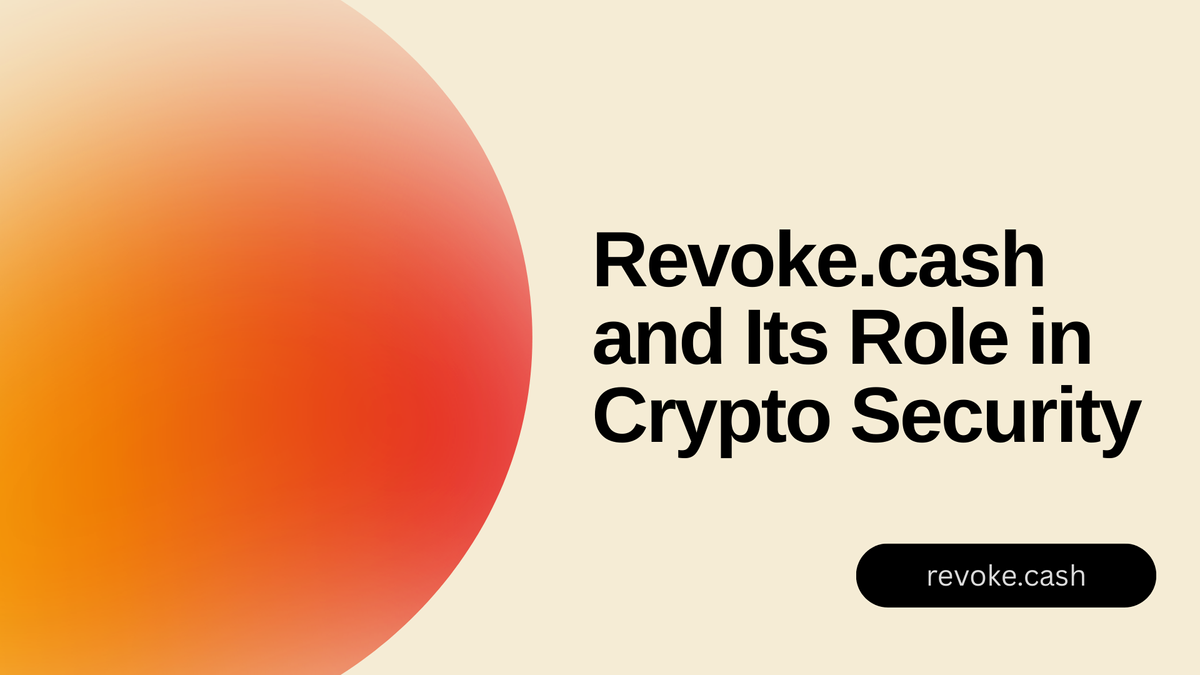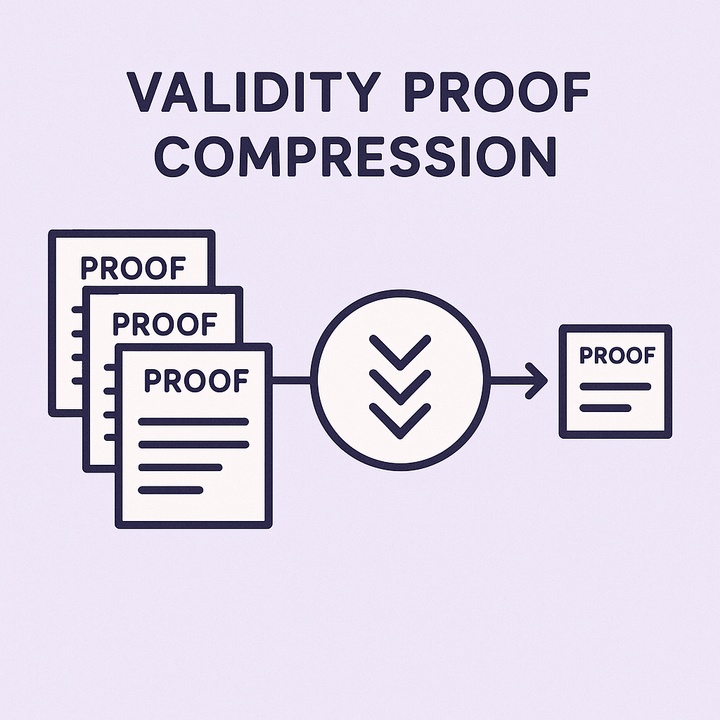Revoke.cash and Its Role in Crypto Security

Introduction: The Growing Need for Wallet Security in Crypto
The cryptocurrency ecosystem has expanded rapidly, with decentralized applications (dApps) like decentralized exchanges (DEXs), lending platforms, and NFT marketplaces becoming integral to user interactions. The DeFi sector alone manages billions in locked value, and the NFT market continues to thrive, with platforms like OpenSea facilitating millions in transactions daily. However, this growth has brought increased security risks, particularly around token approvals—a mechanism that allows dApps to access and spend users' tokens on their behalf. Research suggests that unmanaged token approvals can expose wallets to exploits, phishing attacks, and unauthorized fund drainage, making tools like revoke.cash increasingly essential.
Revoke.cash, a free and open-source tool, addresses this vulnerability by enabling users to inspect and revoke token approvals across over 100 blockchain networks. This survey note explores what revoke.cash is, how it works, and why it is critical for maintaining wallet security in the crypto space, drawing on community insights, technical documentation, and practical guides.
Understanding Token Approvals: A Double-Edged Sword
Token approvals are a fundamental feature of Ethereum and other EVM-compatible blockchains. When you interact with a dApp, such as swapping ETH for another token on Uniswap, you must grant the dApp's smart contract permission to access your tokens. This is done through a transaction that sets an allowance, allowing the contract to spend a specified amount of your tokens. For example, listing an NFT on OpenSea requires approving the marketplace to transfer your NFT when sold.
While necessary for dApp functionality, token approvals pose significant risks if left active indefinitely. Once granted, these approvals remain valid until explicitly revoked, meaning a compromised dApp or forgotten approval could allow unauthorized access to your funds. An analogy often used is giving someone a key to your house: if you don’t take it back, they can enter anytime, even if your trust in them diminishes. In crypto, this could mean losing your entire token balance to a hacked DEX or a phishing scam.
The Risks of Unmanaged Token Approvals
Leaving token approvals active can expose users to several threats:
- Smart Contract Exploits: If a dApp’s smart contract is compromised due to a bug or vulnerability, attackers can exploit approvals to drain user funds. For example, a DEX hack could affect all users who granted it approval, regardless of their current interaction with the platform.
- Phishing Attacks: Malicious actors create fake dApps or phishing sites that trick users into approving contracts designed to steal funds. Once approved, these contracts can drain wallets without further user action, exploiting the trust users place in seemingly legitimate interfaces.
- Forgotten Approvals: As users interact with multiple dApps over time, they may forget which approvals they’ve granted. This is particularly risky in DeFi, where users might approve contracts for lending, borrowing, or trading, only to leave them active long after the interaction ends.
- NFT-Specific Risks: In the NFT space, approvals are critical for marketplaces like OpenSea, but if not revoked, they can lead to theft. For instance, a compromised marketplace could transfer NFTs without the owner’s consent, as seen in past high-profile thefts.
These risks are amplified by the increasing adoption of dApps and the complexity of blockchain interactions, making tools like revoke.cash vital for user protection.
Introducing Revoke.cash: A Tool for Wallet Hygiene
Revoke.cash is designed to address these vulnerabilities by providing a user-friendly interface to manage and revoke token approvals. Created by Rosco Kalis and discussed at Devcon 5 in Osaka, it is an open-source project, with its source code available on GitHub (Revoke.cash GitHub), ensuring transparency and community scrutiny.
How Revoke.cash Works
Using revoke.cash involves three simple steps:
- Connect Your Wallet: Users can connect their wallet (e.g., MetaMask) via the “Connect Wallet” button or enter their wallet address in the search bar. This allows revoke.cash to fetch approval data without immediate wallet connection, enhancing security.
- Inspect Approvals: The tool displays all active approvals for the wallet across supported networks. Users can sort and filter these approvals, using options like network selection and recency, to identify unnecessary or suspicious permissions.
- Revoke Unused Approvals: Users select the approvals they want to revoke and confirm the transaction, which incurs gas fees. This removes the permission for those contracts to spend tokens, effectively “taking back the key” to their wallet.
Revoke.cash supports over 100 networks, including Ethereum, Polygon, BNB Chain, and testnets, making it versatile for users operating across multiple blockchains. It also offers a browser extension that warns users about potentially harmful transactions, adding a preventative layer of security.
Technical Underpinnings
The tool leverages technologies like viem, wagmi, and APIs from Infura, Alchemy, and CovalentHQ for data retrieval. Adding new networks requires updating configuration files and ensuring RPC support, with detailed instructions provided in the GitHub repository. This technical foundation ensures scalability and reliability, supporting its role as a comprehensive security tool.
Why Revoke.cash is Essential in the Crypto Space
As the crypto ecosystem grows, so does the need for robust security measures. Revoke.cash addresses several critical needs:
- Preventative Security: By regularly revoking unused approvals, users reduce the risk of becoming victims of approval exploits, phishing scams, or smart contract hacks. This aligns with the principle that prevention is better than mitigation, as highlighted on the official website (Revoke.cash).
- Wallet Hygiene: Just as physical wallet maintenance involves removing expired cards or receipts, digital wallet hygiene requires periodic checks of approvals. Revoke.cash facilitates this by providing an easy-to-use interface, promoting regular security practices.
- Protection for NFT Holders: NFTs are a prime target for attackers due to their high value. Revoke.cash is particularly valuable here, as seen in guides like the one on TokenizedHQ (How to Use Revoke Cash to Protect Your NFTs), which detail how to revoke approvals for NFT marketplaces to prevent theft.
- Community Endorsement and Safety: Community discussions, such as on Reddit (r/CryptoCurrency on Revoke.cash Safety), generally support revoke.cash’s legitimacy, with users confirming its safety and creator Rosco Kalis (@roscokalison X) verifying its integrity. However, caveats exist, such as past exploits (e.g., Ledger Connect in 2023) and the need to verify URLs to avoid phishing.
- Scalability Across Networks: With support for over 100 networks, revoke.cash caters to the diverse needs of crypto users, ensuring comprehensive coverage in an increasingly interconnected blockchain landscape.
Best Practices for Using Revoke.cash
To maximize the benefits of revoke.cash and maintain optimal wallet security, users should follow these practices:
- Regular Checks: Periodically review approvals, especially after interacting with new dApps. Sorting by recency can help identify recent or suspicious activity, as recommended in community discussions.
- Revoke After Use: Always revoke approvals for dApps once you’ve finished using them, unless frequent use is planned. This minimizes the window of opportunity for exploits, as advised in guides like the one on CryptoHubK (How to Use Revoke.Cash to Deauthorize DApps).
- Verify URLs: Ensure you’re on the legitimate website (Revoke.cash) to avoid phishing sites, a common concern highlighted in Reddit threads. Always double-check the URL and transaction details before connecting your wallet.
- Use the Browser Extension: Install the revoke.cash browser extension for real-time warnings about potentially harmful transactions, enhancing preventative security.
- Educate Yourself: Understand what you’re approving when interacting with dApps. Read transaction details carefully to ensure you’re granting only necessary permissions, as emphasized in educational content on Coinpaper (Revoking Approvals and Revoke.Cash Overview).
- Post-Scam Recovery: If scammed or suspecting unauthorized access, use revoke.cash to revoke recent approvals. While it won’t recover stolen funds, it prevents further theft, as noted in the FAQ on the official site (Revoke.cash FAQ).
Conclusion
Revoke.cash is a vital tool in the crypto space, addressing a critical security gap by enabling users to manage token approvals effectively. As dApp usage and blockchain interactions grow, so does the importance of tools like revoke.cash. By regularly revoking unused approvals, users can protect their wallets from exploits, phishing attacks, and other threats, ensuring the safety of their digital assets.
Whether you’re a DeFi enthusiast, an NFT collector, or a casual crypto user, incorporating revoke.cash into your wallet maintenance routine is a simple yet powerful way to enhance security. Remember, in the crypto world, prevention is always better than mitigation, and revoke.cash empowers users to take proactive steps in safeguarding their funds.
Key Citations
- Revoke Your Token Approvals on Over 100 Networks Revoke.cash
- How to Use Revoke Cash to Protect Your NFTs Tokenized
- r/CryptoCurrency on Reddit Revoke.cash Is it safe
- Revoke or update your token approvals Revoke.cash GitHub
- Everything You Need to Know About Revoking Approvals and Revoke Cash Coinpaper
- How to use Revoke.Cash to deauthorize DApps CryptoHubK
- Frequently Asked Questions Revoke.cash
- r/ethereum on Reddit Update released to revoke.cash allowing you to revoke allowances
MITOSIS official links:
Mitosis University
WEBSITE
X (Formerly Twitter)
DISCORD
DOCS

Comments ()